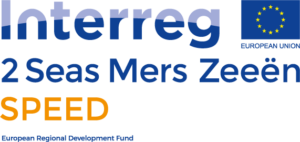Joke Dehond, entrepreneur turned Growth Engineer Consultant for Scale-ups at Sirris, shared some key pointers when it comes to professionalizing your company into the firm you want it to grow into. Sirris is a non-profit organization offering a multitude of experiences and expertise for a range of high-tech industries. By helping small and large players to make justified technological decisions, they support tech-based firms in Belgium toward sustainable growth.
The Interreg SPEED project aims at bridging the gap between the Data Science & IoT market and the Western-European port market. The project’s research team is currently working on a diagnostic toolkit for supporting high-tech smart port focused entrepreneurs in their professionalization track. During the research phase of the toolkit, we connected to some entrepreneur- and growth experts in the high-tech field in order to understand the main needs and hurdles of companies that are past their startup phase and prior to their growth phase. Some of the questions we were interested to unravel were ‘what hurdles arise in the stage in-between?’, and ‘what do you need to know about your firm in order to proceed successfully on your way to growth?’.
Professionalization, beyond the startup and growth phase
Professionalization, though essential, remains somewhat understated. For the startup phase, many practical informational tools are swirling the internet and a large number of startup programs and organizations, such as incubators, exist. Although the growth phase is tackled to somewhat of a lesser extent, supporting tools and growth-reinforcing organizations, such as Sirris, are present and within reach. Of equal importance, but not equally touched upon, is the professionalization of the startup business.
Business basics for successful growth
Joke explains that in order to grow successfully, the basics should be set in place and profound knowledge of the company and its people should be present. Other requirements are access to the right network, with growth capacity; a business plan, in whatever shape or form; and a thorough knowledge of the customer-pool. Essential to the tech-industry, and associated with its fast pace, is an understanding of and knowledge about the industry itself and its trends. Tech-entrepreneurs are usually driven by technology and often lose sight of the traction of the product in the market. Understanding the needs and wants of the customer and connecting them to the strengths and possibilities of the company is key to growing.
Understand your company before you do anything else
To do so, however, a profound understanding of the individual company is necessary. Entrepreneurs require insight into their own management skills, their team’s skills as well as the company’s imperfections. Most small and growing start-ups have different growth paths. One of the decisions forming these differences is that which concerns investment in internationalization for instance. External input might help to structure these decisions, although the question of funds remains a familiar one. What to invest in and when to do so, are decisions that most growing businesses will encounter. Understanding your own company will provide a clearer picture on what and how to professionalize, and how to get ready for growth prior to requesting external expert advice, or even prior to making large investment decisions before the time is right.
We would like to thank Joke Dehond at Sirris for taking the time to talk to us for the benefit of future tech-based companies and research purposes.
For further information on the Interreg SPEED diagnostic and improvement toolkit, please contact Morane Atzmon (Morane.atzmon@uantwerpen.be) or Johanna Vanderstraeten (johanna.vanderstraeten@uantwerpen.be).
To find out more about Sirris, their service, or their team, please visit their website.
You can find Joke Dehond on LinkedIn.
This research project was carried out by Johanna Vanderstraeten, Sascha Albers, Rudy Martens and Morane Atzmon.
Johanna Vanderstraeten is assistant professor of (international) entrepreneurship, Sascha Albers is professor of international management, Rudy Martens is full professor of general and strategic management, and Morane Atzmon is Ph.D. candidate at the Faculty of Business and Economics of the University of Antwerp.
This research benefited from the funding of Interreg 2 Seas.





